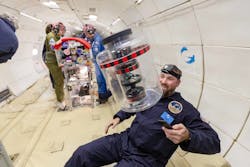NASA announces it is seeking tech for suborbital and orbital flights
By Chloe Tuck at NASA's Armstrong Flight Research Center
WASHINGTON - The National Aeronautics and Space Administration (NASA) have announced that its 2023 TechFlights solicitation is now open. Through TechFlights, researchers from U.S.-based industry, academia, and private research institutions can test technologies on commercial suborbital vehicles or orbital platforms that can host payloads. This bolsters development of technologies that align with U.S. space exploration priorities and supports the expanding space economy.
Managed by NASA’s Flight Opportunities program, TechFlights awardees receive a grant or cooperative agreement of up to $1 million, allowing them to purchase flights directly from any eligible U.S. commercial flight provider that best suits their test needs. Eligible flight platforms include suborbital rocket-powered systems, rocket-powered lander vehicles, high-altitude balloons, and aircraft following parabolic profiles. Orbital platforms hosting payloads are also included, in cooperation with NASA’s Small Spacecraft Technology program.
NASA is seeking proposals to address specific agency goals involving lunar, low-Earth orbit (LEO), and geosynchronous-Earth orbit (GEO) activities.
The first topic is "Advancing the Lunar and LEO to GEO Economies." This entails the demonstration of capabilities that support global lunar utilization, a robust lunar economy, and/or a growing LEO/GEO economy through future commercial commodities and services.
The second topic is "Supporting Commercially Enabled Rapid Space Science." This will support technologies that can support NASA’s Commercially Enabled Rapid Space Science (CERISS) initiative, which aims to develop transformative research capabilities with the commercial space industry to increase the pace of research.
Topic 1 addresses a range of needs that align with the Space Technology Mission Directorate’s (STMD) strategic technology framework, including but not limited to in-situ resource utilization (ISRU) capabilities; entry, descent, and landing technologies; and advanced manufacturing.
A collaborator on the second topic, CERISS is part of NASA’s Biological and Physical Sciences (BPS) Division in the Science Mission Directorate (SMD). The project aims to advance biological and physical research capabilities with the commercial space industry, including sample preparation and analysis technologies for use in microgravity. CERISS’s long-term goals include conducting scientist astronaut missions on the International Space Station and at commercial LEO destinations as well as developing automated hardware for experiments beyond LEO, such as on the lunar surface.
New for the 2023 solicitation, flight opportunities will prioritize the impact of the proposed flight test relative to the amount of funding requested and expected post-flight outcomes. TechFlights evaluation criteria will also emphasize decreasing the amount of time between award and flight testing, with a goal of accelerating the pace of technology development.
Mandatory preliminary proposals are due by 5 p.m. Eastern Daylight Time on 7 June 2023. Full proposals, which are by invitation only, are due at the same time on 4 October 2023. The full solicitation, including pertinent details, is available here: https://nspires.nasaprs.com/external/solicitations/summary.do?solId=%7BB45FA053-D807-9EB2-82F2-C7A157211B08%7D&path=&method=init.
